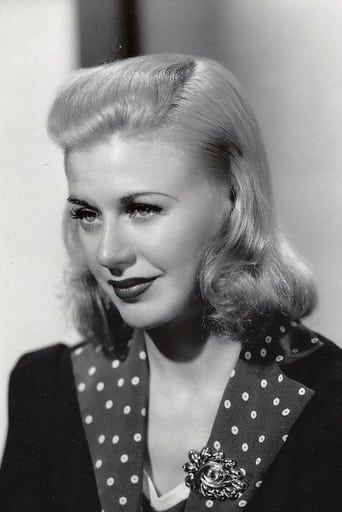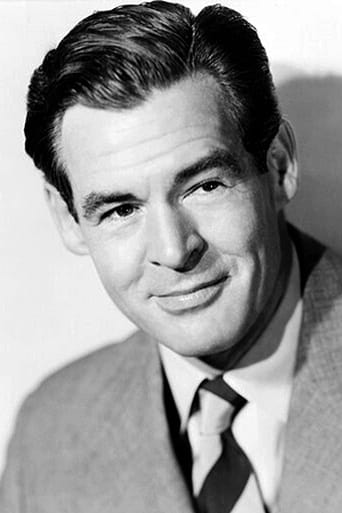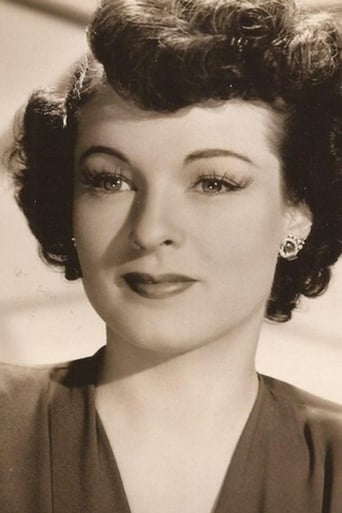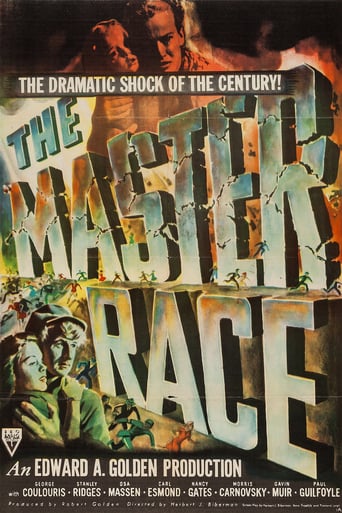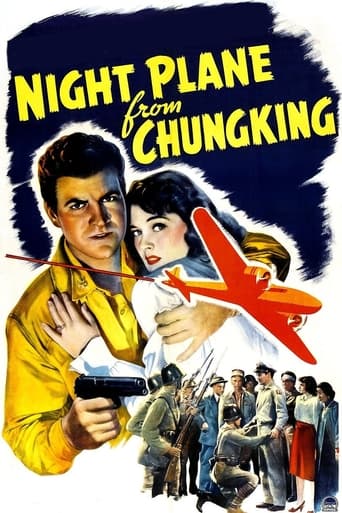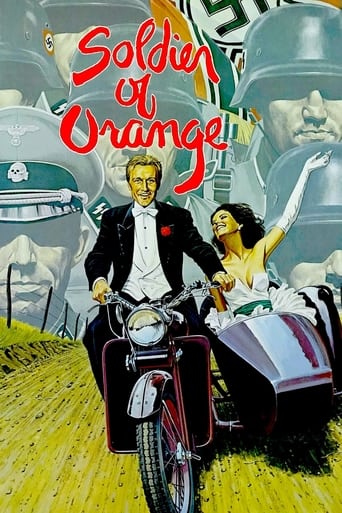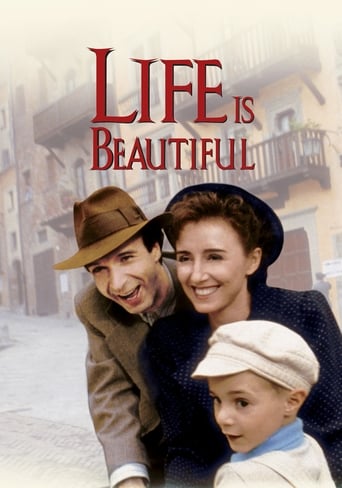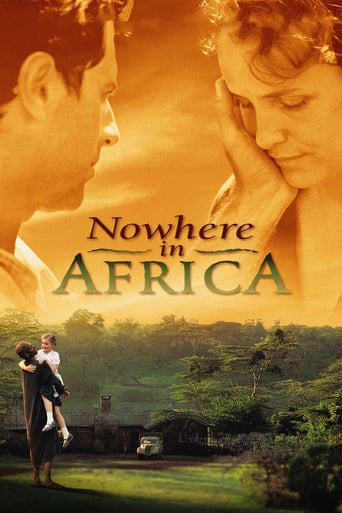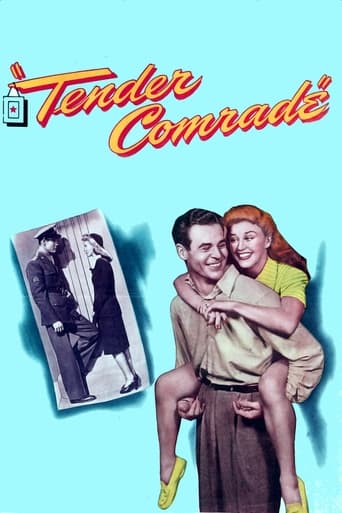
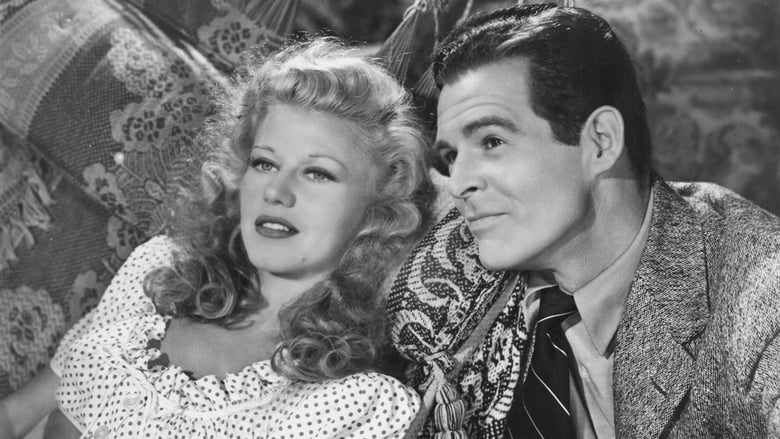
Tender Comrade (1944)
Jo Jones, a young defense plant worker whose husband is in the military during World War II, shares a house with three other women in the same situation.
Watch Trailer
Cast
Similar titles


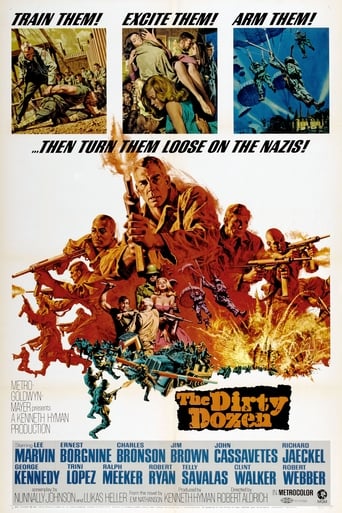
Reviews
Best movie of this year hands down!
Touches You
Fresh and Exciting
it is finally so absorbing because it plays like a lyrical road odyssey that’s also a detective story.
A great film about a small world, the reality of four young wives with their husbands out in the war, sharing a common household to minimize expenses but not managing very well, so they hire a housemaid, who happens to come from Dresden, Germany, with fresh experience of the nastiness of the nazism that murdered that democracy. Yes, there is much war propaganda here, the year was 1943, so it was inevitable, but just forget it, and concentrate on the excellent direction of Edward Dmytryk (as usual) in bringing to life the reality of these soldiers' wives, one of them being Ginger Rogers (for once without any song or dance) and her husband being Robert Ryan as young and fresh and handsome as Gregory Peck. The best scenes are flashbacks of their marriage before the war, which gives a very intimate and interesting insight into the art of direction by Edward Dmytryk. He must have had an expert hand with women.And that's not all. The script is by a young and early Dalton Trumbo, later one of the best script writers of Hollywood after Ben Hecht, and the music adds to it as well. It's almost all domestic scenes inside the common house of the five dames, but it is outstanding as a chamber play. Some get their husbands back from the war, others do not. It is a unique film in its sensitivity of rendering the reality of soldiers' wives some justice and intimate documentation.
For better or worse this is one of the movies always cited when the subject of HUAC comes up, more than likely because writer Dalton Trumbo and director Edward Dymytryck were prominent members of the 'Hollywood Ten' and both served prison sentences. Ginger Rogers was, of course, in private life, a tad to the right of Ghengis Kahn and took exception to some of the dialogue she was asked to speak; the problem was solved by giving the dialogue to Mady Christians, the best actress in the film by a country mile and underused here. Seeing it now, for the first time, I enjoyed it as a wedge of social history and fine acting across the board. It also affords an early glimpse of Kim Hunter, who made her film debut in two films both released in the same year. Well worth a look.
That's how WWII wife Ginger Rogers insists that she and three other co-workers at a war plant in Los Angeles will run the house they rent on Adams Blvd. together while their husbands are away fighting the war. She's very lonely without husband Robert Ryan (seen at the beginning leaving for combat as well as flashbacks throughout the film) so she thinks this will be a great way for all four of them (and the housekeeper they eventually hire) will be able to save expenses. Patricia Collinge, Ruth Hussey and Kim Hunter are the three co-workers; Mady Christians is the German immigrant they eventually hire to be their housekeeper. Each of them are totally different so the typical "roommate" conflicts arise, some amusingly humorous, others more serious and political.What makes this film interesting is the politics behind it involving the creators-both screenwriter Dalton Trumbo and director Edward Dmytryk were both later part of the Hollywood Ten. The hints of communism are really so subtle that you'd have to be a mind-reader or easily manipulated to pick them up. In fact, the film is really so democratic that I'm surprised that it was filmed in black and white, not in Red, White and Blue. It sure has enough stars.If communism is a group of people, unrelated, living together to make ends meet and forming a community, then yes, this is communistic. But, as Myrna Loy would later point out, that if there were communists in Hollywood, they were not the dangerous ones, and they certainly were not out to take over the country. This movie has the message to preserve it. It is simply a movie that offended the conservatives with its rather liberal message.Rogers, is of course, the shining star of the film, still hot after a slew of hit musicals with Fred Astaire and fresh from winning her Oscar for "Kitty Foyle". This was the film that ended her long contract tenure at RKO Radio (even though she'd return a few times later on), and she's playing a very complex character. Like her early 30's sassy pre-code women, she's an outspoken broad who several times in the movie wants to kick herself for putting her foot in it. The scene where she tells off seemingly unfaithful wife Ruth Hussey then finds out that Hussey's husband has just been reported as missing after his ship was bombed in the Pacific Ocean is one of the film's many emotional highlights. Future Oscar Winner Kim Hunter is the young and innocent one whom Rogers becomes a surrogate sister to, while Patricia Collinge (Oscar Nominee for "The Little Foxes") is the older and wiser one who is like their den mother.And then there's Mady Christians as the German Immigrant who fled her homeland after Hitler's takeover, a justifiably angry woman who accuses her own people of murdering their own country. It is her character that is the most political, and that makes sense. If you had to flee your homeland and saw your husband go off to war to fight your own people, you'd be a bit political, too. The issue of rationing is of course one of the film's most discussed, and no bones are made about what a pain it is to have to give up desires like lipsticks and nylons just because the military needs the elements that make them. I have collected World War II ration books found in my family's estate, and they are truly amazing and historical to research.I wonder what happened with the character played by Jane Darwell when Rogers bids Ryan farewell. She introduces herself to the sobbing Rogers then disappears from the film. I wonder if there was a bigger scene cut out, her being so fresh from winning the Oscar for "The Grapes of Wrath".Robert Ryan is one of Hollywood's most unique actors, not traditionally handsome but talented and versatile nonetheless. He could do westerns, gangsters and comedy, and in this film, he is a truly unglamorized leading character that seems as real as the situation as the women are living through.
It's unfortunate that a film with a good cast never really becomes as good as it might. The idea of women working during the war in the war production plants was critical to the war effort, and the attempts at coping with an almost unbearable life situation with women workers sharing a house while their husbands are overseas was common enough to have true dramatic value; yet, this movie never seems to reach its high potential.The reason seems to be in the incredibly poor script, not so much in terms of plot, but in relation to what seems to be substandard language. It's unfortunate that the actors are saddled with such lines as: "If I see you looking sideways at another girl, I'm going to hit you over the head with an axe handle," "It's okay, mom, he's going to marry me," "Why don't the mice pay their share of the rent," "You don't carry a mop length-wise...you carry it like a fishing pole," and "I'm going to beat those rugs until they sit up and yell 'Uncle'."
